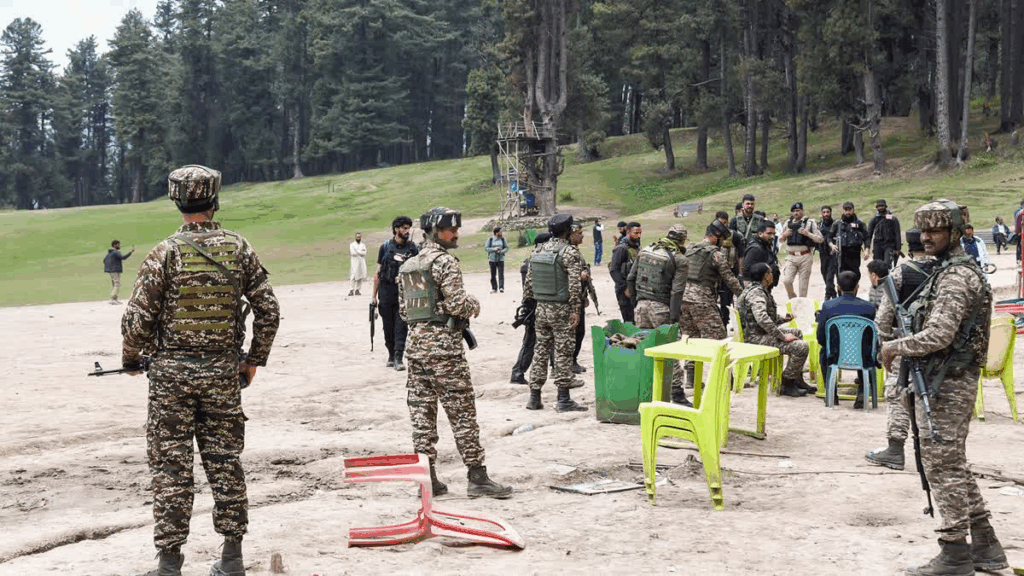In a chilling discovery that has sent shockwaves through India’s security and intelligence circles, probes into the recent Pahalgam terror attack have uncovered a frightening truth: killing operation was masterminded by a former Pakistani commando. It was established by top officials who are part of the study, has renewed fears about cross-border terrorism and the ongoing influx of trained militants into Kashmir.

The Pahalgam Attack: A Summary
The Pahalgam placec, famous for its peaceful landscapes and religious importance, was shaken earlier In the present time, when a quick and concerted attack hit an Indian security convoy and local infrastructure. The attackers were well-armed and well-coordinated, exhibiting military precision and a disturbing level of tactical acumen that immediately put Indian officials on their guard.
The meeting lasts several hours, killed several security personnel and civilians, and left dozens wounded. Eyewitnesses described scenes of mayhem, with the use of guerrilla warfare—hitting and withdrawing into heavily wooded areas—preventing immediate pursuit and confrontation by Indian forces.
Breakthrough in the Investigation
Follow on from the incident, a paired teams of the Jammu and Kashmir Police, Indian Army, and central intelligence agencies launched an intensive probe. Medical Testing of seized weapons, CCTV footage, and survivor testimonies led to an operation that was regular of special forces training.
The leader was captured when one of the attackers was taken prisoner, and under interrogation confessed that the unit was led by a former commando of Pakistan’s Special Services Group (SSG), the special military group that specializes in training in unconventional warfare and special operations. Further intelligence supported this assertion in assigning the leadership to a rogue or unofficially dispatched former SSG operator.

Who Was the Commander?
The mastermind of the attack was known to be “Major Khalid” (alleged name possibly changed for operational security), a retired SSG officer deep knowledge in mountain operations and counterinsurgency. Having released from regular military service under uncertain circumstances, Khalid is known to have joined or seconded to an terror outfit Acting in a role of the larger scope of Pakistan’s “proxy war” operations in Kashmir.
Agency identifies Khalid introduced an unparalleled level of professionalism to the militant operations in the valley. His background allowed the group to employ sophisticated techniques that are rare in homes grown militants, including synchronized attacks, the employment of encrypted communication devices, establishing Sniper Roosts & controlled withdrawal under fire—all methods with which a professional commando would be familiar.
Implications for Regional Security
This development has serious implications for India’s national security equation. First, it emphasizes the ongoing risk of foreign-trained militants seeping into the country, Snipe Sits & increased monitoring and counter-infiltration efforts along the LoC. Second, it forces serious re-questioning of Pakistan’s continued provision of surreptitious support to terror groups In despite diplomatic efforts and international pressure.
Indian officials have registered a strong protest on the reasons that direct involvement of a retired Pakistani army officer represents an escalation. It obfuscates the gap between non-state actors & firms possibly allowed by the pakistan’s military. Such trends can destabilize regional peace plans, including Kashmir alone.

International Reactions
New Delhi has reportedly brought the findings to the attention of important international allies, like the United States, France, and United country’s Security Council members. Greater demands are being made for Pakistan to be held accountable for failing to contain Angry parts in their own ranks. Then many strategists are cautious that if countries fail to stop such behavior by ex-military personnel, it creates a dangerous fresh norm for world terrorism.
India’s Reaction
Following the Pahalgam attack and the surprising admissions, Indian security agencies have grown terrorism. actions in Kashmir. The surveillance effort has been improved, and renewed efforts are afoot to defuse sleeper cells that may be hosting more upgraded operatives. India’s Army too has been recalibrating its counterinsurgency approach in view of the presence of higher-grade military-trained militants.
In addition, political leaders from all sides of the spectrum have been unanimous in denouncing the attack & requesting a strong but controlled response. There is an emerging consensus that while India has to strengthen internal security steps, it must further continue to exercise diplomatic pressure upon Pakistan to eliminate the terror infrastructure germinating across the border.
